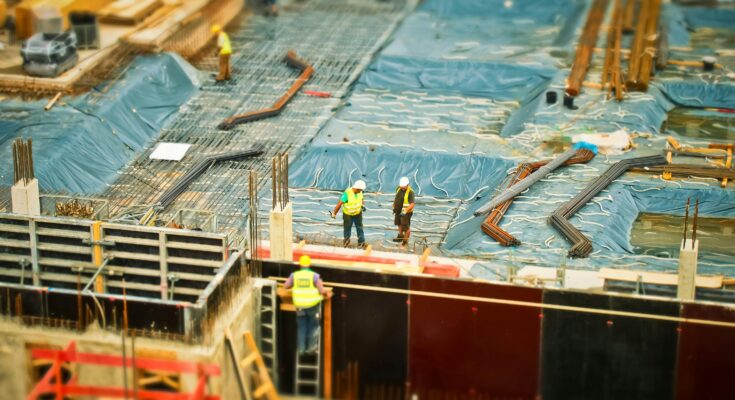Australia Construction Jobs
One of the pillars of the Australian economy, the building sector propels the expansion of residential and commercial real estate as well as infrastructure. Demand for building has increased recently in Australia due to a booming real estate market and government infrastructure spending. From entry-level occupations to highly skilled professions, construction jobs in Australia provide a wide range of opportunities for individuals. The present state of construction jobs in Australia, the kinds of positions that are open, the essential qualifications for those positions, and the prospects for this rapidly expanding industry will all be covered in this article.
An Overview of Australia’s Construction Industry
One of the biggest drivers of Australia’s GDP is the construction sector. Infrastructure projects, specialty trade services, and residential and non-residential construction are just a few of the many activities that fall under this broad category. In addition to construction occupations, the business includes positions in engineering, architecture, project management, and support services. More than 1.1 million individuals are employed in the industry, making up around 9% of the workforce overall, according to current reports. There is a constant need for construction experts due to the ongoing emphasis on large-scale projects including housing expansions, public transportation, and road improvements.
Australian Construction Job Types
In Australia, construction jobs can be divided into groups according to project requirements, specialty, and skill levels. The following are a few typical employment roles:
Bricklayers, carpenters, electricians, plumbers, and other tradespeople are examples of laborers and tradespeople. Tradespeople participate in the practical parts of construction, frequently building or installing different structural components on the job site.
Construction managers are in charge of managing projects from inception to completion. They work in tandem with architects, engineers, and craftsmen to guarantee that projects are completed on time and within budget. Experience, leadership abilities, and technical expertise are all necessary for this position.
Architects and engineers: These professionals are essential to the planning, designing, and managing of building projects. They guarantee that projects fulfill specifications for functionality, safety, and aesthetics. In the field, architects, structural engineers, and civil engineers are in great demand.
Project managers and site supervisors are in charge of overseeing daily activities on building sites and making sure that everything goes as planned. Larger facets of project coordination, such as scheduling and budgeting, are managed by project managers.
Safety Officers: Ensuring adherence to Occupational Health and Safety (OHS) regulations is a primary responsibility of safety officers in the construction sector. They carry out site inspections, offer safety instruction, and put accident prevention techniques into practice.
Qualifications and Skills Required for Construction Jobs
Most construction occupations involve a combination of formal training, practical experience, and certifications, while the qualifications and abilities needed vary by role. These are some essential prerequisites:
Educational Background: Completing an apprenticeship or vocational training is a requirement for many jobs, particularly in trades. A university degree in a relevant discipline is typically required for higher-level positions like engineering and project management.
Licenses and certificates: White Cards, which are required for all construction workers in Australia, are one of the many licenses and certificates needed for many construction jobs. Specialized jobs, such operating heavy machinery, may require additional certificates, such as a High-Risk Work (HRW) license.
Soft Skills: Problem-solving, teamwork, and effective communication are critical in the construction sector. Employees must cooperate with a variety of teams, adjust to shifting project requirements, and fulfill deadlines.
The Need for Construction Jobs in Various Australian Regions
Australia’s states and territory have quite different needs for construction workers. Important areas of activity consist of:
New South Wales: In terms of building projects, NSW is one of the busiest states. The government’s emphasis on infrastructure, including as the Sydney Metro and WestConnex projects, has increased demand for construction experts.
Victoria: Due to large infrastructure projects and Melbourne’s urban expansion, the state has seen a notable increase in the construction industry. Hiring for a range of construction positions has surged as a result of projects like the Metro Tunnel and North East Link.
Queensland: The state’s building industry is bolstered by significant infrastructure spending and population expansion. The need for construction jobs is fueled by initiatives like the Cross River Rail and the development of Brisbane’s transportation systems.
Demand varies in Western Australia and the Northern Territory based on mining and natural resource projects. In these isolated locations, skilled craftspeople and project managers are frequently needed to assist regional development initiatives and mining infrastructure.
Construction Industry Salary Expectations
Depending on the position, level of expertise, and location, salaries in the construction industry might vary significantly. While professional tradesmen like electricians and plumbers can make up to AUD $70,000 to $90,000 annually, entry-level jobs like general laborers usually make between AUD $50,000 and $60,000. Depending on the intricacy of the projects they oversee, construction managers and engineers with years of experience and credentials can attract wages ranging from AUD $100,000 to $150,000 or more.
Many construction workers receive overtime compensation and benefits for working remotely in addition to their normal wage. For qualified workers in particular, the construction business is appealing due to its competitive compensation.
Difficulties in the Construction Sector
Despite its expansion, Australia’s construction sector still confronts a number of obstacles:
Skill Shortages: The business is experiencing an increasing scarcity of competent personnel, especially for engineering and specialized trade positions. The reduction in skilled immigration in recent years has made this shortfall worse.
Safety Concerns: With a high accident and injury incidence, construction is still one of the riskiest sectors. Continued investment in safety training and strict adherence to safety regulations are crucial.
Environmental Regulations: There is growing pressure on the construction sector to utilize eco-friendly materials, cut carbon emissions, and implement sustainable practices. Project budgets and schedules may rise in response to environmental regulations.
Project Delays and Cost Overruns: Because contemporary infrastructure projects are so complicated, delays and cost overruns are frequent problems. It takes expert project management and backup plans to handle these problems.
Australia’s Prospects for Construction Employment
With growth anticipated in both residential and non-residential building, Australia’s construction job future is bright. In the upcoming years, a number of variables are anticipated to fuel the demand for construction professionals:
Government Infrastructure Investments: It is anticipated that significant government investments in public infrastructure would generate thousands of new employment nationwide. A consistent supply of qualified construction workers will be needed for projects like the Sydney Metro West, the Inland Rail, and renewable energy initiatives.
Population Growth and Urbanization: Australia’s population is still increasing, particularly in metropolitan areas. The need for housing, business spaces, and transportation networks is increased by this growth, necessitating the use of professional construction workers.
Sustainable building techniques, such as the use of eco-friendly materials and energy-efficient designs, are becoming more and more important in the construction sector. Professionals with experience in sustainable construction will be in high demand as the sector shifts to more environmentally friendly methods.
Technological Developments: The construction sector is changing as a result of new technologies like robotics, 3D printing, and Building Information Modelling (BIM). As the sector modernizes, workers with expertise in these fields—such as technology managers and BIM coordinators—will be highly sought for.
How to Enter the Construction Sector in Australia
Here are some pointers to get you started if you want to work in Australia’s construction sector:
Obtain a White Card: Anyone working in construction must complete the White Card course in order to receive a certification. The fundamentals of occupational health and safety are covered in this course.
Full Relevant Training: Apprenticeships and vocational education offer the necessary skills for a variety of trades. Numerous businesses collaborate with educational institutions to provide apprenticeships in a variety of fields, including electrical, plumbing, and carpentry.
Get Experience and Develop a Network: Even in entry-level positions, obtaining work experience can be helpful because many construction jobs require practical experience. Through industry networking, employees might discover possible employers and open new job chances.
Think About Specializations: Higher-paying positions and more job stability might result from specialized skills like engineering, project management, or operating heavy machinery.
Australia Construction Jobs
For those with a variety of abilities and specialties, construction jobs in Australia provide fulfilling employment prospects. The construction business continues to be a desirable choice for job seekers due to its high demand for skilled workers, competitive pay, and numerous prospects for career progression. But issues like a lack of skills and environmental stresses call for a dedication to lifelong learning and flexibility. Employees who engage in pertinent training and qualifications will be well-positioned to prosper in this fast-paced business as Australia’s construction sector grows and changes.



